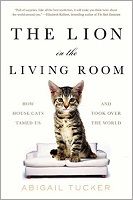The Lion in the Living Room: How House Cats Tamed Us and Took Over the World

The Lion in the Living Room: How House Cats Tamed Us and Took Over the World - Abigail Tucker
Non-Fiction
Pages: 256
I'm a cat-owner, always have been. I love dogs but I've never owned one, always had cats. And I love my little fur-babies, but reading this book did make me side-eye them a little bit, as they dozed beside me in the warm spot next to the radiator, fluffy belly up, paws crocked, snuffling in their sleep. So cute and cuddly and harmless. Right? Wrong. I'm now convinced that the cats will rule the world one day. If they don't already, and there's definitely arguments to be made there, most of them detailed in this book.
It was truly fascinating to take this kind of hard analytical look at a relationship I've never really thought much about. What do we get from pet cats, exactly? They're not loyal and unconditionally affectionate like dogs; they're not pack animals and they don't tolerate company much; they're almost impossible to train; they haven't historically been service or labour animals; they don't help us hunt, protect us from threats; unlike dogs or even horses, they're not much good for therapy animals. Your modern pet dog is the result of thousands of years of domestication and genetic mutation - pet cats have changed very little through domestication, they are still miniature lions and tigers with the great majority of those wild predator instincts intact. They certainly don't need us in the way dogs do - your average abandoned pet dog will starve, your pet cat might sulk for five minutes and then go off and hunt down breakfast. So why are we so damn obsessive about them?
The answer, surprisingly enough, could be a form of mind control. Ah-ha!, I hear some of you shout. I always knew it. Cats carry a parasite known as Toxoplasma gondii, which causes a disease known as toxoplasmosis. Up to half the world's population could be infected with toxoplasmosis, and in most adults it causes no symptoms, although it can be a risk to foetuses. However, studies have shown that toxoplasmosis does cause behavioural changes in rodents and other small animals - namely removing their fear of cats, increasing their chances of being eaten and the toxoplasma parasites returning to their favourite home, cats' intestines. Is it possible toxoplasma causes some kind of behavioural change in humans, pre-disposing us to fuzzy feelings towards the miniature versions of our historic predators? It's an intriguing argument. Studies have also uncovered an intriguing link between toxoplasmosis and schizophrenia, which means there could well be a germ of truth or explanation behind the 'Crazy Cat Lady' stereotype!
This is just an example of the kind of nuggets of fascinating information strew throughout this book. From the fact that housecats are in the top 100 of worldwide threats to nature to the unseen stresses of living alongside humans, from Egyptian cat-worship to modern cat cafes, from the similiarities between Fuzzy Puddykins and your basic African man-eater, it's all here. Some reviews have described this book as negative or cat-phobic, but I don't see it that way all - and I'm a cat-lover. This book simply strips some of the emotional blinkers from our eyes (or perhaps the parasite-induced hypnosis) and highlights the modern cat in all its incredible, dynamic, brutal, predatory, adaptable glory. I was left quite in awe of the modern housecat - it truly is taking over the world, one living room (or entire house or flat in some cases) at a time!